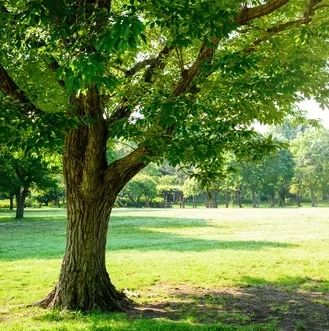Can global warming be averted simply by planting some trees?
It may seem like a simplistic solution but planting trees can be a real game changer – and it could even save the planet.
The problem is how many trees we need!
The Committee on Climate Change has stated that the UK, alone, needs to plant 1.5 billion more trees to become carbon neutral!
Although the target can feel overwhelming, it doesn’t change the fact that every tree planted will help.
The power of a tree
Why are they so important? The Woodland Trust explains: “Trees are the ultimate carbon capture and storage machines. Like great carbon sinks, woods and forests absorb atmospheric carbon and lock it up for centuries. They do this through photosynthesis.
“The entire woodland ecosystem plays a huge role in locking up carbon, including the living wood, roots, leaves, deadwood, surrounding soils and its associated vegetation.”
The Trust points out that trees do more than trap carbon. They also:
• Prevent flooding
• Reduce city temperatures
• Reduce pollution
• Keep soil nutrient-rich
Ecologist Joe Fargione, says that, “Trees are having a bit of a moment right now. There’s no anti-tree lobby. Trees have lots of benefits for people. Not only do they store carbon, they help provide clean air, prevent soil erosion, shade and shelter homes to reduce energy costs and give people a sense of well-being.”
Prof Tom Crowther at the Swiss university ETH Zürich, agrees. He estimates that a worldwide planting programme could remove just under one-third of all the emissions from human activities that remain in the atmosphere today.
Talking about the power of tree planting, he says, “What blows my mind is the scale… it is overwhelmingly more powerful than all of the other climate change solutions proposed.”
Where should trees be planted?
Typically, not all scientists are as optimistic as Professor Crowther. Many believe that the size of the planting challenge is an unrealistic target. Others are concerned that focussing too much on trees takes away the emphasis from changing the damaging habits that have caused the problem in the first place.
Other scientists caution that by planting in the wrong place, you could actually make the problem worse.
Another ecologist, Dr Bonnie Waring, advises that trees should only be planted in areas that naturally support forests – planting on grasslands, peatlands, or in tundra ecosystems can have unintended consequences that enhance warming.
Planting trees to capture carbon is pointless if in doing so it releases already trapped carbon. Savannas and natural grasslands, for instance, already hold plenty of carbon in their soils.
Different regions need different solutions. According to BBC Future, the best place to plant new trees is the tropics, where trees grow fastest and thus trap the most CO2. In contrast, planting trees in snowy regions near the poles is likely to cause a net warming, while planting them in temperate climates – like that of the UK, much of Europe and parts of the US – may have no net effect on climate.
How we can all help
At Rubix, we wanted to go further – so we are very pleased to sign up to the fantastic scheme set up by the wonderful people at Oblong Trees.
Oblong Trees asks UK employers to fund the planting of 240 trees for every employee over the next ten years. If each business planted 240 trees for each employee then we will have planted over 8 billion more trees in a decade, well over the UK’s target of 1.5 billion.
There is no doubt that planting trees is a positive step in tackling climate change, but random planting has virtually no impact.
It is reassuring to know, therefore, that the Oblong Trees initiative that doesn’t just arrange for trees to be planted, it does its research to work out where they should plant trees. Although, they do some UK planting, the vast majority are planted in locations where carbon capture can be maximised.
In our first year, our contribution will be used to plant trees in the UK, Australia, Kenya, Malawi, Indonesia, Peru and DR Congo. For us, it is a long-term commitment.
If you would like to find about more about the power of planting trees, go to www.oblongtrees.com for more information.






